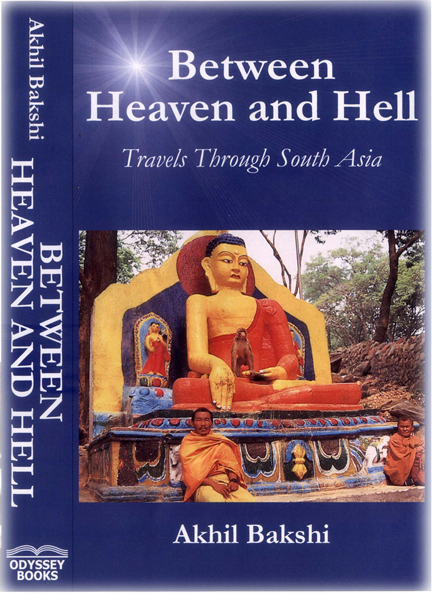|
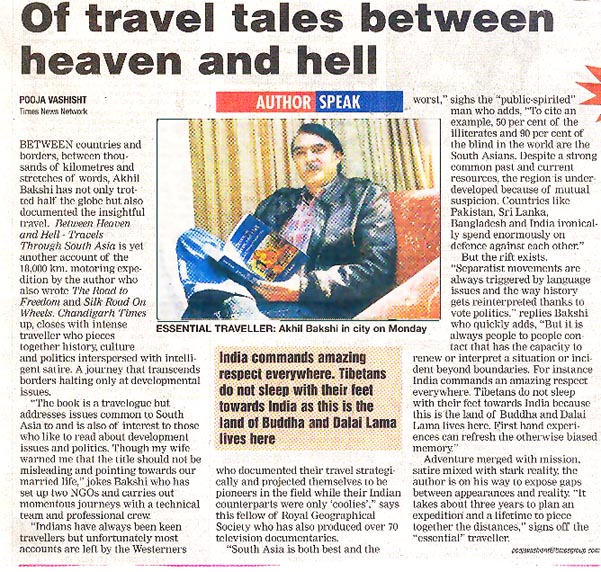
Top
The Indian Express, Chandigarh, 03.Feburary
2004

Top
The Hindustan Times,
Chandigarh, 03.Feburary 2004
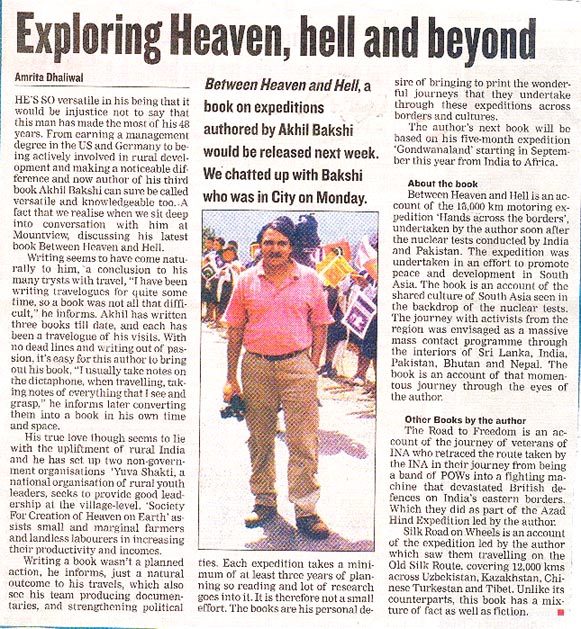
Top
The Statesman
24th April, 2004

Top
Maharashtra Times
Mumbai
26th April, 2004
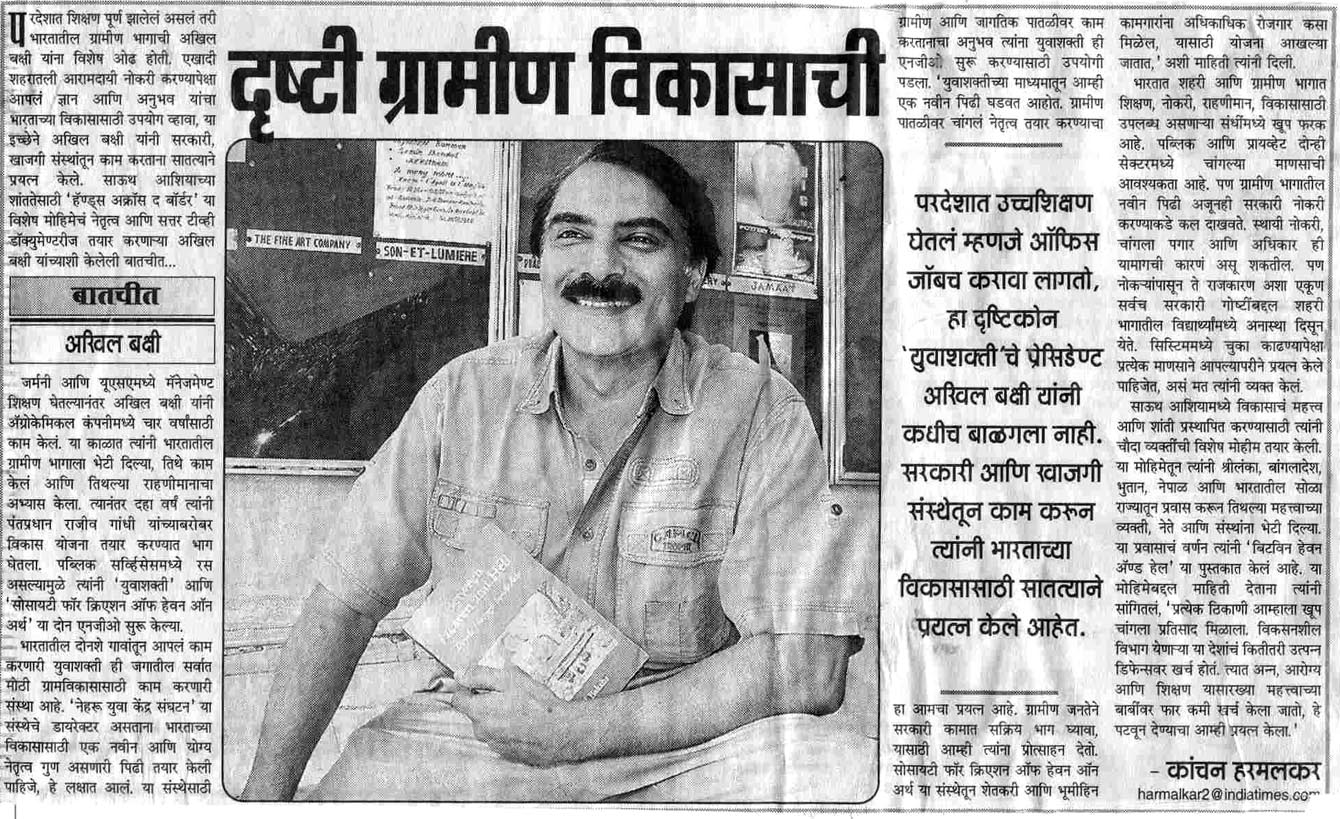
Top
Deccan Herald
Monday, May 03, 2004
An expedition between ‘heaven and hell’
Akhil Bakshi, in his latest travelogue talks of issues facing South
Asian countries as much as the experiences that helped complete the
book.
BALA CHAUHAN
He’s toured 58 countries, written three voluminous travelogues, made
documentary films, some of which have won awards and some of which
were telecast on Discovery and National Geographic channels. Akhil
Bakshi is now busy making preparations for his expedition to
‘Gondwana Land’; a trip from the tip of South India to South Africa,
beginning this September. His latest travelogue, ‘Between Heaven and
Hell,’ has been launched recently. He was in Bangalore to promote
his book.
It took Akhil five years to complete the travelogue, which is about
his motoring expedition - Hands Across the Borders - to promote
peace and development in South Asia. The three-month long expedition
took off soon after India and Pakistan conducted their nuclear
tests. “We organised a Yuva Shakthi expedition that included
activists from the South Asian countries. Our objective was to
promote peace among countries. It was an 18,000-km mass contact
programme through Sri Lanka, Bangladesh, Bhutan, Nepaland 16 states
of India. The book covers issues facing South Asian countries,” says
Akhil.
‘Between Heaven and Hell’ has been divided into five parts - Sri
Lanka, Coromandel Coast, Bangladesh, Bhutan, Nepal, Indo-Gangetic
plain and Western India.
Why has he named the book Between Heaven and Hell? “After having
travelled 58 countries I felt South Asia was one of the best places
in the world but squalor and poverty have turned it into hell. Also,
people are divided among themselves because of suspicion,” he adds.
The book is full of trenchant caustic humour. It begins with a wry
joke on late Zia ul Haq, the former president of Pakistan, by a
middle aged Pakistani professor. “Humour helps puncture pomposity,
alleviate boredom and reconcile the governed to being bossed
around,” says Akhil in his book. The size of the travelogue looks
daunting - 556 pages in small print.
“A traveller would love the book. I am not sure about others. My
wife has not been able to go beyond Chapter Two. The book has a
collection of our experiences and has real life people and
anecdotes. There are stories, some of which address larger issues,”
he says.
While talking about the expedition, Akhil recalls certain
interesting and intriguing incidents. “We were going through the
Thrumsangla Pass in Bhutan when all of a sudden the weather went bad
and the visibility became very poor. Just when we were wondering how
to get out of the situation a black dog appeared from nowhere,
guided us through the clouds and later disappeared. There’s a famous
legend in the area according to which dogs are supposed to show the
dead the way to heaven.
“In another incident we were crossing Shirdi in Maharashtra. A
friend, who was a Shirdi Baba devotee, asked me to make a wish. I
was a bit concerned about the tour because we had not got clearance
from the Pakistan government. I asked Baba to help. Two days later
my wife called me and told me that we had been granted permission by
Pakistan,” recounts the author.
Akhil was in the Prime Minister’s Office during the tenure of P V
Narasimha Rao. He was also the Director General of Nehru Yuva Kendra
Sangathan. He now runs a film production company. He has authored
two other travelogues - ‘Road to Freedom’, on the Azad Hind
expedition and ‘Silk Road on Wheels’. ‘Between Heaven and Hell’ is
published by Odyssey Books and is priced Rs 495.
Top
Deccan Herald,
Sunday, May 16,
2004
Tales of a novel
peace mission
The
narrations range from development and religion to
politics and culture, filtered through the prism of
sarcasm and wit.
Between Heaven and Hell: Travels Through South Asia
Akhil Bakshi
New Delhi: Odyssey Books, 2004
pp 556, Rs 495
This travelogue documents the South Asian motoring
expedition of a group of activists (with the author as
their leader), “Hands Across the Borders,” that was
formed after India and Pakistan conducted their nuclear
tests in 1998.
The group’s laudable objective was one of promoting the
message of peace and development through South Asia, via
a series of mass-contact programmes, panning the
interiors of Sri Lanka, India, Bangladesh, Bhutan, Nepal
and Pakistan.
If there is one word that can be used to describe the
book, it is “irreverence.” Akhil Bakshi dwells at length
on wide-ranging matters like development, religion,
politics and culture but always through the prism of
sarcasm and wit, and yet displaying a thorough
understanding of South Asia in his narrations.
There is no doubt that Bakshi has his finger on the
pulse, from an observation like, “Given the present
technology, resources and organisational skills, no
South Asian child need die. What is lacking is the
political will to persuade governments to hesitate,
before pouring unlimited money into the coffers of the
generals and the admirals for delivering death and
destruction in the name of deterrence, peace and
security.”
The author uses a peculiar brand of humour (often
risque) to have a dig at the South Asian religions;
gods, goddesses, priests and religious customs all come
in for attack. Perhaps aimed at holding the interest of
the non-Asian reader, this is where Bakshi is sometimes
guilty of belabouring the point and crossing the
“Lakshman rekha.” Barring this and the one unfavourable
(and somewhat unfair) reference to V P Singh and his
style of governance, the narrative flows in lyrical
fashion, especially when the author describes the scenic
beauty of the places visited, and writes with candour
about South Asian peace-building measures.
Interesting black and white, and colour photographs add
grist to this travelogue. It is undoubtedly a good book
to read and possess, for the wealth of information that
it packs in. Some careful and imaginative editing could
have made for a crisper narration.
Bakshi makes several allusions to “Dutt Sahib,” the
Hindi film legend and parliamentarian, Sunil Dutt, who
does more than providing the glamour factor to this
expedition, whose mission the author touchingly sums up
in the last chapter, when he quotes from the verse of
Ali Sardar Jaffri:
“Come, bearing the gardens of Lahore on your shoulders
We will bring the light of a Banaras dawn
And the fragrance of the Himalayan air
And then we will ask, who is the enemy?”
After being educated abroad, Bakshi worked as
Director-General of the Nehru Yuva Kendra Sanghathan. He
worked with two Prime Ministers, Rajiv Gandhi and P V
Narasimha Rao, and during this time, extensively
travelled through rural India, both working and living
in villages. Bakshi has authored several books.
Melanie P Kumar
|
The Hindu
Thursday, Apr 29, 2004
Between frivolity and gravity
Akhil Bakshi, who has just released a book on his travel through
South Asia, has yet another trip and some vague political plans up
his sleeve
AKHIL BAKSHI meets a Pakistani professor on the flight to Sri Lanka,
at the start of the Hands Across Borders expedition through South
Asian countries — "a mass contact programme to sensitive the leaders
and people that youth of South Asia does not want any strife and
tension in the region." The two hit it off, speaking in earthy
Punjabi and sharing jokes on their political leaders. That proves an
"auspicious start" to a three-month friendship pilgrimage, despite
the irony of Pakistan itself not giving Akhil and his team
permission to enter the country.
"We wanted to convince South Asian people, united in both problems
and potential, that we should either swim or sink together," says
Akhil, who has now documented the experiences of the
18,000-kilometre motoring journey in Between Heaven and Hell. Akhil
says with pride that the team faced no hostility anywhere. They had
the approval of local governments. The book, in fact, carries
messages from the prime ministers of all the nations they visited.
More importantly, everyone knew that it was "for the poor people", a
journey that sought to strengthen the "shared heritage".
If one wants more proof of the goodwill of people, he cites the
example of school children in a village near Ratnapura in Sri Lanka
singing "Jana Gana Mana" every day. Ask him why they would do that,
considering that a similar activity within our own border would be
dubbed "anti-national", and Akhil comes up with a "Big Brother
India" explanation: people in the entire region regard India with
great respect. Bangladeshis have high regard for our "contribution
to their liberation movement" and Tibetans don't sleep with their
feet towards India because
it's the land of the Buddha.
The team, one learns, was also careful not to offend the powers that
be, wherever they went. They didn't, for instance, step into the
Eelam territory. The idea was, after all, not to ruffle feathers
unnecessarily.
Dominated by a tone of irreverent humour, the 550-odd pages of
Between Heaven and Hell weaves history, myths, developmental issues,
religion, politics, culture, and social idiosyncrasies of the
countries Akhil and his team visit. The chapter on Sri Lanka, for
instance, talks about the strife between LTTE and the Lankan army
(not much on IPKF, though), the parliamentary structure, the
enormous military expenses of the warring parties, the Buddhist
monuments, the power of the clergy, the double-edged
Dutugamunu-Elara story about the Sinhalese-Tamil relationship, the
country's fascination for cricket, and so on.
The book, in stretches, crackles with keen, balanced observations
and easy prose. Akhil's conversation with a watchman at Ayodhya and
his observations of the military machismo at Wagah border, for
instance, offer sharp, no-nonsense perspectives on weighty issues.
The jokes thrown into the narrative also add to the readability —
such as the hilarious rendering of the Ramayana by a young couple on
the Sri Lankan beach, the French girl's explanation on the "lingam"
suffixed to many South Indian names, and the yarns on gods and
saints.
But Akhil seems to go overboard with his irreverence and humour on a
number of occasions. They not only sound laboured, but are also
highly inappropriate. Consider this sentence that is part of a
passage on the notorious Sati at Deorala. "...And since the act of
suicide is being performed with the full backing the support of
doting family and community, there is no need to leave a dull and
boring suicide note." Disapproving as he may be of the incident
itself, this "light heartedness" is surely in bad taste in the
context. The book abounds in such examples.
Akhil also tends to shock you with his foreigner-like perspective
and sweeping generalisations on important aspects of history. This
sentence would sound completely blasphemous to anyone who loves the
ghee-rich Tirupati ladoos: "The nauseous smell of lard emanated from
the kitchen, where huge quantities of sweet ladoos were being
prepared for the pilgrims." The long and disputed history of strife
between Buddhism and Hinduism and Adi Shankara's role in it gets
resolved in two simple sentences: "...In a remarkable feat, Buddha
was merged into Hinduism as the ninth incarnation of Lord Vishnu. By
the by, the divided spiritual loyalties of the populace flowed back
to mainstream Hinduism." And V.P. Singh, along with Mandal
Commission, gets sentenced thus: "V.P. Singh succeeded Rajiv as
India's Prime Minister, and the social divisions that he unleashed
took the country back many hundred years."
Akhil, who did most of his schooling in Germany and M.B.A. in the
U.S., returned to India and worked with two Congress Prime
Ministers, Rajiv Gandhi and P.V. Narasimha Rao. He talks with pride
of his work with Rajiv in Amethi in making it a "model
constituency". Akhil later went on to become the Director of Nehru
Yuva Kendra Sanghatan. He is the founder of two NGOs working with
youngsters. He talks passionately about the deplorable state of
politics in India today. "Do you know that 125 out of 425 MLAs in
Uttar Pradesh have a criminal record? With the young and educated
losing interest in politics, anti-social elements are having a
heyday."
Would this passion translate to him contesting the next election,
one wonders. He surprises you with a: "I would rather form a brand
new party... with the best 500-odd people in the country." He
already has a few agendas up his sleeve. He holds forth:
"Reservation is not good for the country or the communities
themselves..."
But all these ideas are on hold right now, as he is busy planning
his next trip through Gondwana Land — a 45,000-kilometre ride
through 18 countries in five months. One can surely expect yet
another book in a couple of years. Only hope it won't be more
voluminous than the present one, which could have been reduced by at
least a 100 pages with some intelligent editing.
BAGESHREE S.
Top
Travels through South Asia
By: A Sunday Mid Day Correspondent
May 30, 2004
| Akhil Bakshi led an 18,000
km motoring expedition across South Asia: Sri Lanka, India,
Bangladesh, Bhutan, Nepal and Pakistan. Sunday
Mid Day extracts from his book on his
encounters |
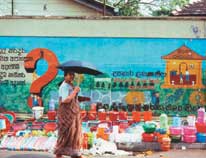 |
|
A
street vendor in Colombo |
Sri Lanka
Colombo, the history-drenched capital of Sri Lanka, seemed
to be under siege. Sandbags, barricades and pillboxes were
erected at regular intervals. Gun-toting policemen in blue
uniforms and batik helmets had taken over the street outside
the airport. They were there, I assumed, to check, frisk,
intimidate and terrorise innocent people. But their actions
did not seem to confirm my assumptions. They occupied
themselves scratching their feet with the barrels of their
automatic weapons; gossiping with their arms thrown over
each other's shoulders; sipping tea noisily; eyeing passing
women; and helping spick-and-span children weighed down by
heavy school bags, cross roads. The security blanket seemed
cold.
Passing Ungiriya and Kiriella on A8, we got to Horana in the
Kalutara district. Wijitha Kanangara, our clueless
navigator, driving in the lead vehicle stopped at Sripalee
Vidyalay, a high school… The Indian poet Rabindranath Tagore,
the first South Asian to win the Nobel Prize — in 1915 for
literature — had visited the school in the early 1900s... We
were pleasantly surprised to hear that our anthem was sung
every morning by the students of this Sri Lankan school. The
principal got together the school choir, and soon the
exquisitely soft strains of "Jana gana mana" came floating
from the instruments.
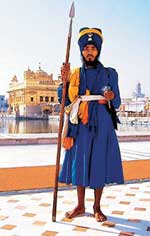 |
|
A Nihang
at the Golden Temple in Amritsar |
Coromandel Coast
Our fifth jeep, christened Padma, met us in Chennai. Driving
in Padma and a hired mini-bus, we toured some of the popular
religious sites near Chennai. The bus driver, Rajiv, was an
old man, dressed in a starched white safari suit. A powerful
walrus moustache stretched across his distinguished face.
"You go to all these temples to pray?" asked Rajiv,
mockingly. "I have been 5,000 times to Tirupati, where all
the world comes for darshan. But only went once inside the
temple. These places are not holy. Only dens for making
money. If you take money out of your pocket, the priest lets
you have a glimpse of the idol. Otherwise, he rudely pushes
you away. Such behaviour never happens in a church or a
mosque or gurudwara. Hindu priests are fraud. Only after
money. Stupid, rich people come here and throw away tens of
thousands of rupees in a temple. But they have no money to
give to the poor. They will not give me even 10 rupees for
lunch. And, anyway, more of the idols in the temple are
fake. The real ones have been smuggled out of the country by
the corrupt priests and customs officials."
India was playing a cricket match against some country. I
requested Rajiv to tune into the radio commentary. He did
so. Twirling his enormous whiskers, he said reflectively:
"Many years I work as a driver. Many big and famous people I
have seen. They are all junk. People like junk. All movie
stars and cricketers I drive. They are zero. You know that
great hero, the former Indian cricket captain… (name
withheld)? I once see him from my bus waiting at hotel. A
beautiful Marwari girl comes at 9.30 at night in a red
Maruti car. He go away with her and come back at four in the
morning. That day he batting for India — out on first ball!
Then all balls bowling wide.
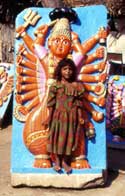 |
|
The
little goddess in Madhya Pradesh |
Stamina finish at night. India lost. Many times I watch
Indian cricket team practicing. When movie actresses come,
they leave their bat and ball and run after them. Anyway, no
point in watching match or listening commentary. These days,
all matches fixed."
Nowhere is God pampered more than in Tirumala, the heavenly
abode of Lord Vishnu, a four-hour drive north of Chennai, in
the state of Andhra Pradesh. Vishnu's incarnation, sometimes
called Venkatesh and sometimes Balaji, is the presiding
deity here. God is woken up in the morning to the sound of
music, bathed with milk, decorated with ornaments suited to
the day of the year, rocked in golden swings, and taken for
walks and boat rides in a procession, with the accompaniment
of music, lights and scented flowers. On special occasions,
he is carried atop gold and silver-plated vehicles — Garuda,
elephant, lion, chariot, sun and he moon. As a bonus, God
gets to wed his consort every day.
The Venkateshwara temple at Tirumala can more than afford to
lavish all these luxuries and extravagances on God. It is
the richest place of worship in the whole wide world. The
Vatican comes a poor second. On an average, 50,000
worshippers flock to Tirumala each day, 365 days a year. God
is made to work 14 hours a day. On special occasions, like
festivals and sacred days, he must work 20 hours a day to
accommodate one lakh worshippers. I am not aware if he gets
paid overtime for the extra hours put in.
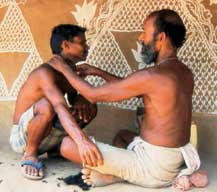 |
|
The
village barber in Puri |
If Moody's were to give Tirumala a credit ratings, it would
be right at the top of the rung. An undisputed industry
leader, it has the biggest customer base. It collects a
whooping Rs 350 crore, or $70 million, and about 350 kg of
gold annually as donations from the flood of pilgrims. It
owns the most lucrative assets, none of them a dud. It has
investments of Rs 400 crore — approximately $76 Million.
This does not include the untold treasures stored away in
its closets — countless pounds of extremely antique gold and
silver jewellery; tones of rubies, emeralds and diamonds;
clothes woven with golden threads; and thousands and
thousands of acres of arable village lands, gifted by
medieval kings. To help invest funds, the temple has several
banking friends. It has built up large holdings in
educational institutions and hospitals. Some of the money is
utilised to purchase tones of spices, vegetables and oil
that is required to feed, free of cost, 15,000 people a day.
Some of it goes into paying the salaries of the security
guards and other personnel, the temple being the largest
single employer in all of south India. The rest goes into
the sacred bellies of the army of priests. Tirumala has no
memory of being touched by a dark recession. The sun always
shines on it and the business is on a constant upswing. At
this stable of gods, it is always boom time.
Mr Chaudhary, our host at Tirupati, was a zealous fan of
Lord Venkatesh, alias Balajis, alias Vishnu, the presiding
deity of the Tirumala temple… As we entered the temple,
Chaudhary became a man possessed. Heads turned and temple
walls reverberated with his passionate cries of "Govinda,
Govinda", calling out to the saviour in an exuberant display
of his great affection and love for the god. Flawlessly
chanting long, breezy Sanskrit mantras at the top of his
voice, he kissed every pillar, lunged at the feet of every
idol, and stood with folded hands before the life-size
statues of the Vijaynagar emperors paying homage to Balaji.
He appeared to be speaking to the idols, feeling the
distinct power and presence of the divine spirits. Every
once in a while. Chaudhary would stop to give a series of
tight slaps to his cheeks. This was to "neutralise the
arrogant ego," he said.
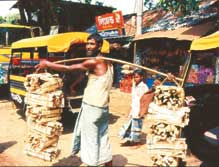 |
A
firewood seller in Bangladesh.
Pics: Akhil Bakshi |
We walked barefoot through vast courtyards and pillared
halls. Great works of art adorned the walls and columns and
filled the public spaces. The whiff of incense was
everywhere. The nauseous smell of lard emanated from the
kitchen, where huge quantities of sweet ladoos were being
prepared for the pilgrims. The spherical roof of the main
shrine, in the middle of the inner compound of the temple,
is covered with sheets of gold. The flow of pilgrims was
stopped to allow the expedition members to have a special
audience with God. At Bangaro Vakili, the golden door, we
waited to heart the recitation of the morning hymn.
Suprabatham. Then we move forward hurriedly and expectantly
till we came face to face with the god. There he stood,
crowned and ornamented, from head to toe, blazing with
priceless garlands of diamonds and rubies, and covered with
aromatic flowers and sandalwood. The only part of the stone
statue that was visible was the sides of the face below the
crown. The eyes were covered with paste so that his gaze may
not set the earth ablaze. I was so dazzled by the ornate
statue and the ambience of the sanctuary that I could not
observe its finer details. |
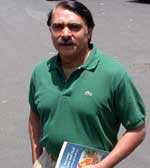 |
Akhil Bakshi travelled across South Asia as
part of a motoring expedition to promote
peace and development.
These anecdotes have been excerpted from his
book of experiences: Between Heaven and
Hell — Travels Through South Asia, published
by Odyssey Books.
Pic: Vijayanand Gupta |
India abroad
“People across south Asia have a lot of respect for
India. For instance in Tibet, we met monks who said
that while sleeping at night they made sure their
feet didn’t point to India, the land of Buddha.
In Bangladesh, people are still grateful for our
help in gaining them freedom. But history books have
diluted our contribution. People worry about the
India’s cultural invasion through TV, they fear that
their culture will be destroyed through our song and
dance. It is the same in Nepal and Bhutan...
Across south Asia, they feel that integration
between the countries has been hampered because of
the relations between India and Pakistan. That’s
watched closely.” |
|
Top
The
Indian Express,
May21,2004
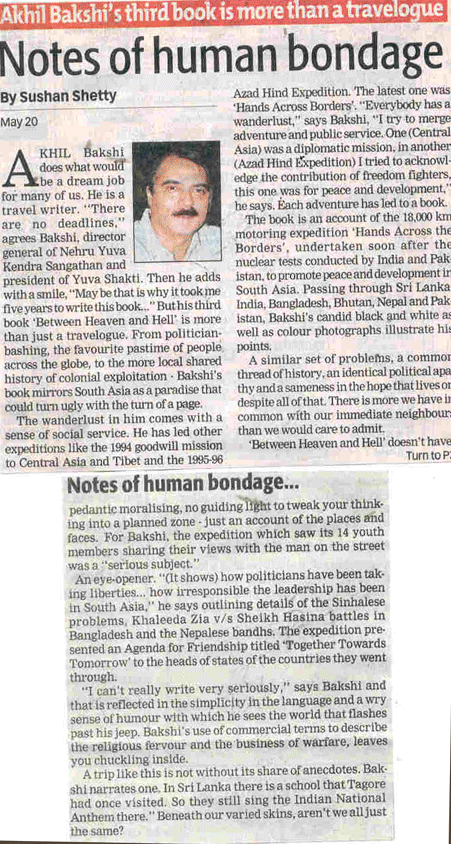
Top
The Telegraph
Odyssey with a peace missive
SUDESHNA BANERJEE
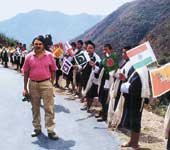
Colours of amity: Bakshi en
route to Trashiganj in Bhutan
Thrumshing La, the highest motorable pass in Bhutan. A convoy of
five Mahindra Armadas was threading its way up the mountains at a
height of about 12,375 feet when a white-out took place. The road
was treacherous and visibility low. So the convoy, carrying team
leader Akhil Bakshi and MP Sunil Dutt among others, ground to a halt
in the snow.
“Suddenly this shaggy black dog appeared from nowhere and started
walking in front of us,” recounts Bakshi, in Calcutta on a short
trip. The dog guided the team to safety through the army of clouds,
waiting when the vehicles slowed down. “The Bhutanese believe that
the dog guides the soul in afterlife,” muses the man who went on to
complete the motoring expedition, covering 18,000 km.
If spiritual forces guided the course, it was the twin nuclear tests
undertaken by the then-hostile neighbours in 1999 that had flagged
off the journey, under the banner of the Delhi-based forum Yuva
Shakti. Fourteen members were carrying the message of peace and
development across Sri Lanka, Bangladesh, Bhutan, Nepal and 16
states of India. “All of south Asia is one huge family. We have a
joint destiny. Yet the ghost of Partition prods us to fight each
other.” The members would be out by 8 am and “stagger in” at 1 or 2
pm. “We must have addressed around 1,000 meetings in the three
months.”
Bakshi has mapped the memories and the miles clocked in the
expedition as well as his peace missive in a book Between Heaven and
Hell, released recently. “It tells the story of our journey in a
tongue-in-cheek manner, questioning attitudes imposed from the top
and satirising divisive policies like the arms race while millions
suffer in poverty and ignorance.”
The former officer on special duty to ex-Prime Minister P.V.
Narasimha Rao fondly recounts the warm reception from people. “On a
highway in Bhutan, kids travelled from as far as four km away to
greet us with hand-painted flags,” he says.
Though Pakistan was the most obvious destination to take the peace
message to, circumstances kept the country out of the itinerary.
“The Kargil war had intensified. So both Dutt saab and the embassy
suggested that we give it a miss.”
Bakshi, who describes himself as a tramp, is no stranger to
long-distance missions. In 1994, after the disintegration of the
Soviet Union, he had trekked up the famed Silk Road, to “revive
cultural ties with the people of Central Asia”.
But it was the Azad Hind Expedition in 1995-96 that threw up more
enduring moments. “With veterans of the Indian National Army, we
traced Netaji’s route from Singapore. In Malaysia, where he had
recruited his men, they met former colleagues and wept like
children.”
Bakshi is already charting the course for his next mission — to
Africa. “Some 265 million years ago, before the shift of the
continents took place, India was part of the African mainland.” The
journey will have a scientific motive this time, with a team of
seismologists and geologists accompanying Bakshi
|
![]()
